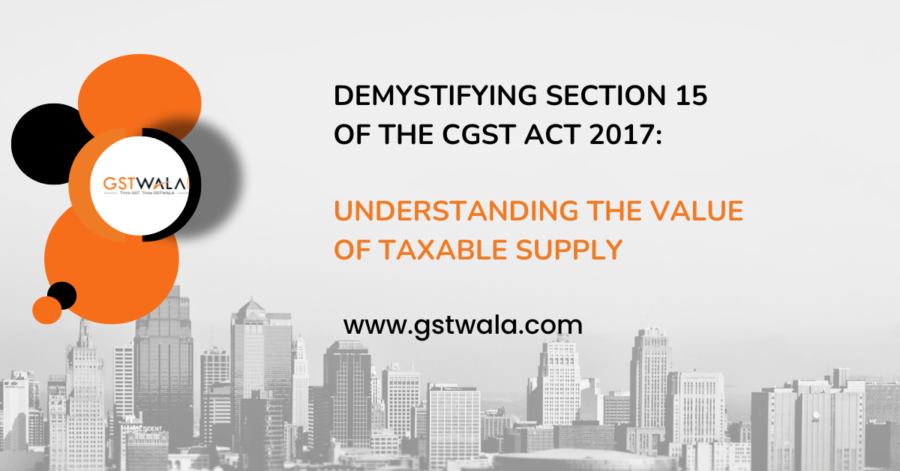
Demystifying Section 15 of the CGST Act 2017: Understanding the Value of Taxable Supply
Exploring the Significance of Section 15: Within the intricate framework of the Goods and Services Tax (GST) regime in India, Section 15 of the CGST Act 2017 emerges as a cornerstone, delineating the methodology for determining the value of taxable supplies encompassing goods and services. Grasping the nuances of this section assumes paramount importance for businesses, serving as a compass to navigate through the complexities of tax liabilities. Let’s embark on a detailed exploration of Section 15 and the accompanying CGST rules governing the diverse valuation methods prescribed within.
Understanding Section 15Section 15 of the CGST Act stipulates that the value of the supply of goods or services shall generally be determined based on the transaction value. This transaction value refers to the actual price paid or payable for the goods or services when the supplier and recipient are not related, and the price is the sole consideration for the supply. However, this section also lays down several key points that businesses must consider when determining the value of taxable supplies:
Transaction Value: The price actually paid or payable for the goods or services, where no relation exists between the supplier and recipient, forms the basis for determining the value of taxable supply.
- Inclusions in Value of Supply: The value of supply includes taxes, duties, incidental expenses, interest, penalties, and subsidies linked to the consideration.
- Exclusions from Value of Supply: Discounts offered before or at the time of supply, duly recorded in the invoice, are excluded of from the transaction value.
- Determination Methods: In cases where the value cannot be determined based on transaction value, prescribed methods such as open market value, supply of like kind and quality, cost-based valuation, or residual method are employed.
CGST Rules Governing Valuation Methods: The CGST rules further elaborate on the valuation methods for determining the value of taxable supply:
- Open Market Value: This method considers the full value in money, excluding GST, for transactions where the supplier and recipient are unrelated, and price is the sole consideration.
- Supply of Like Kind and Quality: Similar goods or services supplied under comparable circumstances are valued based on their characteristics, quality, quantity, and reputation.
- Specific Rules for Certain Transactions:
- Related Party Transactions: Open market the value or value based on supply of like kind and quality.
- Supply between Principal and Agent: Open market value or 90% of the price of like kind and quality by the recipient.
- Residual Method: When other methods are inapplicable, the value is determined based on principles outlined in Section 15 and CGST rules.
Exploring Section 15 of the CGST Act: Section 15 of the Central Goods and Services Tax (CGST) Act, along with its corresponding CGST rules, offers a comprehensive framework for determining the value of taxable supplies. While transaction value serves as the primary determinant for most transactions, businesses must also familiarize themselves with the various valuation methods prescribed under the rules.
Understanding the Provisions: Businesses is need to delve into the intricacies of Section 15 and the accompanying CGST rules to ensure accurate compliance with GST regulations. These provisions not only outline the methodology for determining the value of taxable supplies but also provide clarity on specific scenarios where alternative valuation methods may be applicable.
Mastery of Section 15 and the CGST rules related to valuation methods empowers businesses to navigate GST compliance effortlessly. By adhering to these prescribed guidelines, businesses can accurately ascertain their tax liability and mitigate the risks associated with non-compliance. It’s imperative for businesses to stay informed and compliant with the provisions outlined in Section 15 of the CGST Act 2017 to ensure smooth operations within the GST framework.
Stay ahead of the curve with gstwala.com; Together, let’s simplify GST for a smoother business journey.
We are just a click away info@gstwala.comTop of Form
